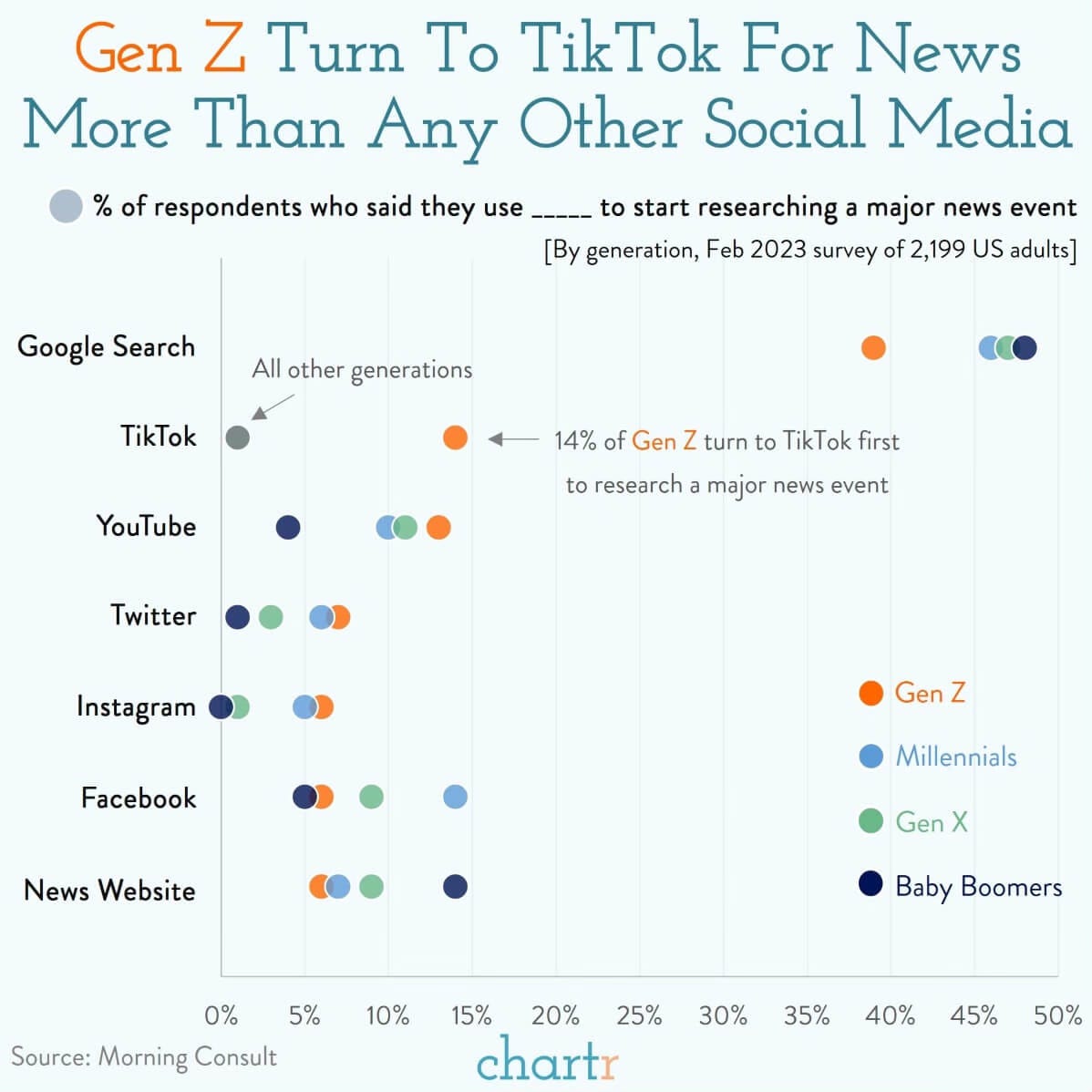In the rapidly evolving realm of digital media, the once unassailable reign of search engines faces a formidable challenger: social media. As platforms like TikTok and Instagram become Gen Z's go-to sources for information, the very essence of how we discover content is undergoing a seismic shift. In this era where Google's dominance wanes and conversational search takes center stage, publishers must recalibrate their strategies to navigate this transformative landscape.
There is no doubt that we are living in a new era for media publishers, which has seen a transformation into a digital reality and a widespread embrace of digital subscriptions. This shift has been beneficial for those who have successfully navigated it, but it primarily caters to loyal users who are familiar with and value these brands and their content. However, this demographic typically comprises less than 10% of the total audience. While this is significant, what about the potential to attract new readers who could potentially become loyal users in the future? Despite being challenging, this prospect holds immense promise.
Navigating the digital landscape to reach a broader audience entails adapting to mega-platforms that are often reluctant to share their insights, despite benefiting from our continual use of their search engines, which poses a significant challenge.
Primary source
In a recent interview with Wired Sundar Pichai, CEO of Google, acknowledged that the company is preparing for a future dominated by AI-based tools, where "search is not king" anymore. This aligns with the observed trend that social media platforms, particularly TikTok, Instagram, and YouTube, have become integral to Generation Z, akin to how Google Search was for older generations. These platforms serve as their primary sources for news and current events, prompting most major publishers to establish a presence on them. We are witnessing a transformation: social media apps, short-form videos, and generative AI are reshaping our traditional methods of accessing information online.
The growth of TikTok as a tool for discovering new content exemplifies a shift in how we search online. Regarding monetization, it's essential to recognize that while social media once primarily boosted awareness, it now plays a pivotal role throughout the entire sales funnel for younger audiences, extending to the transaction stage. Therefore, it's crucial for publishers to consider how they can create a social media sales funnel.
Trailblazing
In my research, I explore trends often associated with labels like Gen Z or Gen Alpha as indicators of phenomena that transcend age demographics. The youth often serve as trailblazers, identifying and embracing new movements before they permeate older generations. They act as cultural beacons, leading the way for older generations to follow. Hence, it's critical not to overlook them, regardless of the demographic being targeted.
Apart from the frequently mentioned frustration with Google Search results cluttered with ads or what Cory Doctorow termed "enshittification", there is another reason people turn to social media for information instead of traditional search or media websites: social media offers unique value by providing diverse perspectives and real-time updates that other platforms often lack.
According to a recent report by YPulse, most individuals aged 13-39 agree that social media is the go-to destination for learning about a topic. They find its diverse range of perspectives empowering, as it allows them to form their own opinions rather than passively consuming information.
This poses a significant challenge. Previously, people tended to stick to their favorite sources of insights, often treating them as their "single sources of truth," and it was the publisher's role to understand and represent their audience. However, in today's disrupted media landscape, much more is required.
Experience
There is an immense opportunity for those willing to engage with users through the most compelling, meaningful, reliable, and inspiring content. The term "part" is particularly important here: users prefer an interactive experience where they can dynamically react to content, making the entire experience feel like a conversation.
According to the Accenture Life Trends Report 2024, information discovery is transitioning from a search mode to a conversational mode, which offers greater flexibility, nuance, and personalization. The report highlights that 39% of individuals aged 18-34 are enthusiastic about conversational answers over standard internet searches, and major players are increasingly responding to this need, as evidenced by Google's Circle to Search feature, as reported by Wired. For instance, users can snap a photo of an unfamiliar game and ask, "How do you play this?" prompting Google's AI to provide an overview. Another option is pointing the phone at a broken appliance and asking, "How do I fix this?" Half of US consumers already use voice search daily.
Regardless of what happens with TikTok or the pace at which LLMs (Large Language Models) are developed — and the competition is fierce — these factors must be considered when crafting content, distribution, and business strategies. If unsure, it's worth exploring the hypothetical scenarios for 2027 and 2052 outlined in the latest Future Today Institute Report 2024 as a precautionary measure.
Try this at home
What can individuals in news organizations do with this information (aside from mastering SEO for TikTok, Instagram, and other platforms)?
Ignite interest across the newsroom by delving into topics collectively, bypassing the gradual rollout and engaging in stimulating discussions as a team.
Enhance the value and distinctiveness of your offerings. Content should feel spontaneous and relatable, maintaining a tone that resonates with everyone. Focus on creating content that transcends different platforms, offering fresh perspectives, clear explanations, and practical tips.
React swiftly.
Concentrate on solutions: Shift focus towards reporting on solutions and purpose-driven stories, empowering the audience with positive narratives.
Collaborate with creators.
Strengthen relationships with other publishers; we are all navigating the same challenges.
Bonus: Embrace the advice from Carl Holden, Creative Director of Zellus Marketing, an agency specializing in SEO & AI: "Don't Tell: Answer, Don't Show: Share, Don't Sell: Persuade."
Your task is to adapt these principles to align with your brand's identity.






